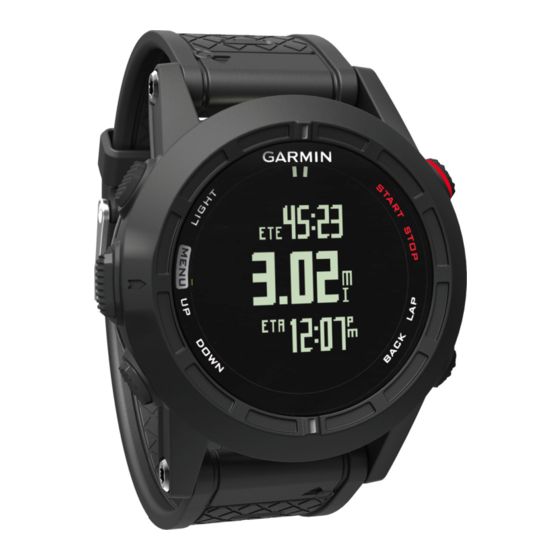Garmin fenix 2 Gebruikershandleiding - Pagina 19
Blader online of download pdf Gebruikershandleiding voor {categorie_naam} Garmin fenix 2. Garmin fenix 2 26 pagina's. Sports and fitness gps-devices
Ook voor Garmin fenix 2: Beknopte handleiding (25 pagina's), Snelstarthandleiding (4 pagina's)

The Garmin logos on the module and the strap should be
right-side up.
2
Wet the electrodes
on the back of the strap to create a
strong connection between your chest and the transmitter.
3
If the heart rate monitor has a contact patch
contact patch.
4
Wrap the strap around your chest, and connect the strap
hook
to the loop
.
The Garmin logos should be right-side up.
5
Bring the device within 3 m (10 ft.) of the heart rate monitor.
After you put on the heart rate monitor, it is active and sending
data.
TIP: If the heart rate data is erratic or does not appear, see the
troubleshooting tips
(Tips for Erratic Heart Rate
Tips for Erratic Heart Rate Data
If the heart rate data is erratic or does not appear, you can try
these tips.
• Reapply moisture to the electrodes and contact patch.
You can use water, saliva, or electrode gel.
• Tighten the strap on your chest.
• Warm up for 5–10 minutes.
• Wash the strap after every seven uses
Rate
Monitor).
• Wear a cotton shirt or wet your shirt if suitable for your
activity.
Synthetic fabrics that rub or flap against the heart rate
monitor can create static electricity that interferes with heart
rate signals.
• Move away from sources that can interfere with your heart
rate monitor.
Sources of interference may include strong electromagnetic
fields, some 2.4 GHz wireless sensors, high-voltage power
lines, electric motors, ovens, microwave ovens, 2.4 GHz
cordless phones, and wireless LAN access points.
• Replace the battery
(Replacing the Heart Rate Monitor
Battery).
ANT+ Sensors
Foot Pod
Your device is compatible with the foot pod. You can use the
foot pod to record pace and distance instead of using GPS
when you are training indoors or when your GPS signal is weak.
The foot pod is on standby and ready to send data (like the
heart rate monitor).
After 30 minutes of inactivity, the foot pod powers off to
conserve the battery. When the battery is low, a message
appears on your device. Approximately five hours of battery life
remain.
Setting the Foot Pod Mode
You can set your device to use foot pod data instead of GPS
data to calculate pace and distance.
1
2
3
, wet the
Foot Pod Calibration
Calibrating your foot pod is optional and can improve accuracy.
There are three ways to adjust the calibration: distance, GPS,
and manual.
Calibrating Your Foot Pod by Distance
Before you can calibrate your device, you must pair your device
with the foot pod
For best results, the foot pod should be calibrated using the
inside lane of a regulation track or an exact distance. A
regulation track (2 laps = 800 m or 0.5 mi.) is more accurate
than a treadmill.
1
2
3
4
5
Calibrating Your Foot Pod by GPS
Data).
Before you can calibrate your device, you must acquire GPS
signals, and pair your device with the foot pod
Sensors).
1
2
3
4
Calibrating Your Foot Pod Manually
(Caring for the Heart
Before you can calibrate your device, you must pair your device
with the foot pod
Manual calibration is recommended if you know your calibration
factor. If you have calibrated a foot pod with another Garmin
product, you may know your calibration factor.
1
2
3
Hold MENU.
Select Settings > Sensors > Foot Pod.
Select an option:
• Select Indoor when you are training indoors without GPS.
• Select Always On when training outdoors, when your
GPS signal is weak, or when you lose satellite signals.
(Pairing ANT+
Hold MENU.
Select Settings > Sensors > Foot Pod > Calibrate >
Distance.
Select Start to begin recording.
Run or walk 800 m or 0.5 mi.
Select Stop.
Hold MENU.
Select Settings > Sensors > Foot Pod > Calibrate > GPS.
Select Start to begin recording.
Run or walk approximately 1 k or 0.62 mi.
The device informs you when you have traveled far enough.
(Pairing ANT+
Hold MENU.
Select Settings > Sensors > Foot Pod > Calibrate >
Manual.
Adjust the calibration factor:
• Increase the calibration factor if your distance is too low.
• Decrease the calibration factor if your distance is too high.
Sensors).
(Pairing ANT+
Sensors).
15
